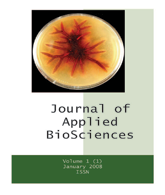Journal of Applied Biosciences (J. Appl. Biosci.) [ISSN 1997 - 5902]
Volume 49: 3444 - 3451. Published January 29, 2012.
Prévalence de Cronobacter spp. et d’autres entérobactéries dans les préparations en poudre pour nourrissons (PPPN) commercialisées à Abidjan
*Yao K.1,4, Zinzendorf N. Y.2,4, Bohoua G.1, Kouassi K. A.1, Koua A.3, Kouame P.1, Loukou Y. G.2,4, Kouadio L.3.
1 Unité de Formation des Sciences et Technologie des Aliments (UFR – STA), Université d’Abobo – Adjamé, email : [email protected], Téléphone : (225) 02 90 67 32 ou (225) 40097830
2Département de Bactériologie, Virologie, UFR - SPB, Université d’Abidjan-Cocody, email : [email protected], Téléphone : (225) 08 90 67 32 ou (225) 40097830
3 Département d’Hydrologie et de Santé Publique, UFR - SPB, Université d’Abidjan - Cocody
4Laboratoire National de la Santé Publique - Côte d’Ivoire, Service de Biologie Médicale et de Microbiologie Alimentaire et Industrielle
Auteur correspondant e-mail : [email protected]
ABSTRACT
Objectif : Le but de cette étude était d’évaluer la prévalence de Cronobacter spp (Enterobacter sakazakii)pathogène opportuniste émergent et d’autres entérobactériesdans les préparations en poudre pour nourrissons (PPPN) commercialisées à Abidjan.
Méthodologie et Résultat : L’étude a été réalisée au Laboratoire National de la Santé Publique (LNSP) à Abidjan de mai à septembre 2005 sur la qualité microbiologie de 185 échantillons de préparations en poudre pour nourrissons (PPPN) commercialisées à Abidjan. La recherche et dénombrement des entérobactéries ont été effectués selon les normes AFNOR NF V 08-021(2002) et Cronobacter spp. a été recherché selon la méthode décrite par Kandhai et al. (2004b).Les résultats ont révélé que 20,54 % (38) des échantillons étaient contaminés par des entérobactéries. La prévalence de Cronobacter spp. a été de 63,16 % (24/38) des échantillons contenant les entérobactéries et de 12,97 % (24/185) de l’ensemble des échantillons analysés. Les souches d’entérobactéries isolées ont été essentiellement Cronobacter spp., Salmonella reading, Klebsiella pneumoniae, Pantoea spp., Citrobacter diversus et Citrobacter freundii, Enterobacter cloacae, Serratia ficaria et Serratia odorifera. Au total, 59 isolats d’entérobactéries ont été identifiés et Cronobacter spp.a été prédominant (40,68 %).
Conclusion et application : Les résultats obtenus ont montré un niveau de contamination important des PPPN commercialisées sur le marché abidjanais par des entérobactéries avec la prédominance des Cronobacter spp. et la présence d’un risque réel d’infection des consommateurs en termes de santé publique.
Mots clés : Cronobacter spp., Préparation en Poudre Pour Pourrissons, Abidjan.
Abstract
Objective: The purpose of this study was to assess the prevalence of Cronobacter spp.(Enterobacter sakazakii) an emergingopportunistic pathogen andother Enterobacteriaceae in the powdered infant formula (PIF) marketed in Abidjan.
Methodology and results: The study was conducted at the National Laboratory of Public Health (LNSP) in Abidjan from May to September 2005 on microbiological quality of 185 samples of powdered infant formula (PIF) marketed in Abidjan. The enumeration of Enterobacteriaceae was performed according to standard NF V 08-021 and Cronobacter spp. was searched using the method described by Kandhai and al. (2004b). The results showed that 20.54% (38) samples were contaminated with Enterobacteriaceae. The prevalence of Cronobacter spp. was 63.16% (24/38) of samples containing Enterobacteriaceae and 12.97% (24/185) of all samples analyzed. Strains of Enterobacteriaceae were mostly isolated Cronobacter spp., Salmonella reading, Klebsiella pneumoniae, Pantoea spp., Citrobacter diversus and Citrobacter freundii, Enterobacter cloacae, Serratia ficaria and Serratia odorifera. In total, 59 isolates of Enterobacteriaceae were identified and Cronobacter spp. was predominant (40.68 %).
Conclusionand application: The results obtained showed a significant level of contamination of PIF marketed in Abidjan by Enterobacteriaceae, Cronobacter spp. and the presence of a real risk of infection to consumers in terms of public health.
Keywords: Cronobacter spp., Powdered Infant Formulas, Abidjan.
FULL PAPER [PDF AVAILABLE HERE]
